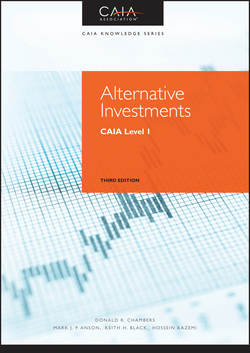Читать книгу Alternative Investments - Hossein Kazemi - Страница 9
На сайте Литреса книга снята с продажи.
PART One
Introduction to Alternative Investments
CHAPTER 1
What Is an Alternative Investment?
1.1 Alternative Investments by Exclusion
ОглавлениеAlternative investments are sometimes viewed as including any investment that is not simply a long position in traditional investments. Typically, traditional investments include publicly traded equities, fixed-income securities, and cash. For example, if a particular investment (such as private equity) is not commonly covered as equity in books on investing, then many people would view it as an alternative investment.
The alternative-investments-by-exclusion definition is overly broad for the purposes of the CAIA curriculum. First, the term investment covers a very broad spectrum. A good definition of an investment is that it is deferred consumption. Any net outlay of cash made with the prospect of receiving future benefits might be considered an investment. So investments can range from planting a tree to buying stocks to acquiring a college education. As such, a more accurate definition of alternative investments requires more specificity than simply that of being nontraditional.
This book and the overall CAIA curriculum are focused on institutional-quality alternative investments. An institutional-quality investment is the type of investment that financial institutions such as pension funds or endowments might include in their holdings because they are expected to deliver reasonable returns at an acceptable level of risk. For example, a pension fund would consider holding the publicly traded equities of a major corporation but may be reluctant to hold collectibles such as baseball cards or stamps. Also, investments in very small and very speculative projects are typically viewed as being inappropriate for such an institution due to its responsibility to select investments that offer suitable risk levels and financial return prospects for its clients.
Not every financial institution, or even every type of financial institution, invests in alternative investments. Some financial institutions, such as some brokerage firms, are not focused on making long-term investments; rather, they hold securities to provide services to their clients. Other financial institutions, such as deposit-taking institutions like banks (especially smaller banks) might invest in only traditional investments because of government regulations or because of lack of expertise.
Of course, institutional-quality alternative investments are also held by entities other than financial institutions. Chapter 2 of this book discusses the alternative investment environment, including the various entities that commonly hold them (e.g., endowment funds and wealthy individuals).
